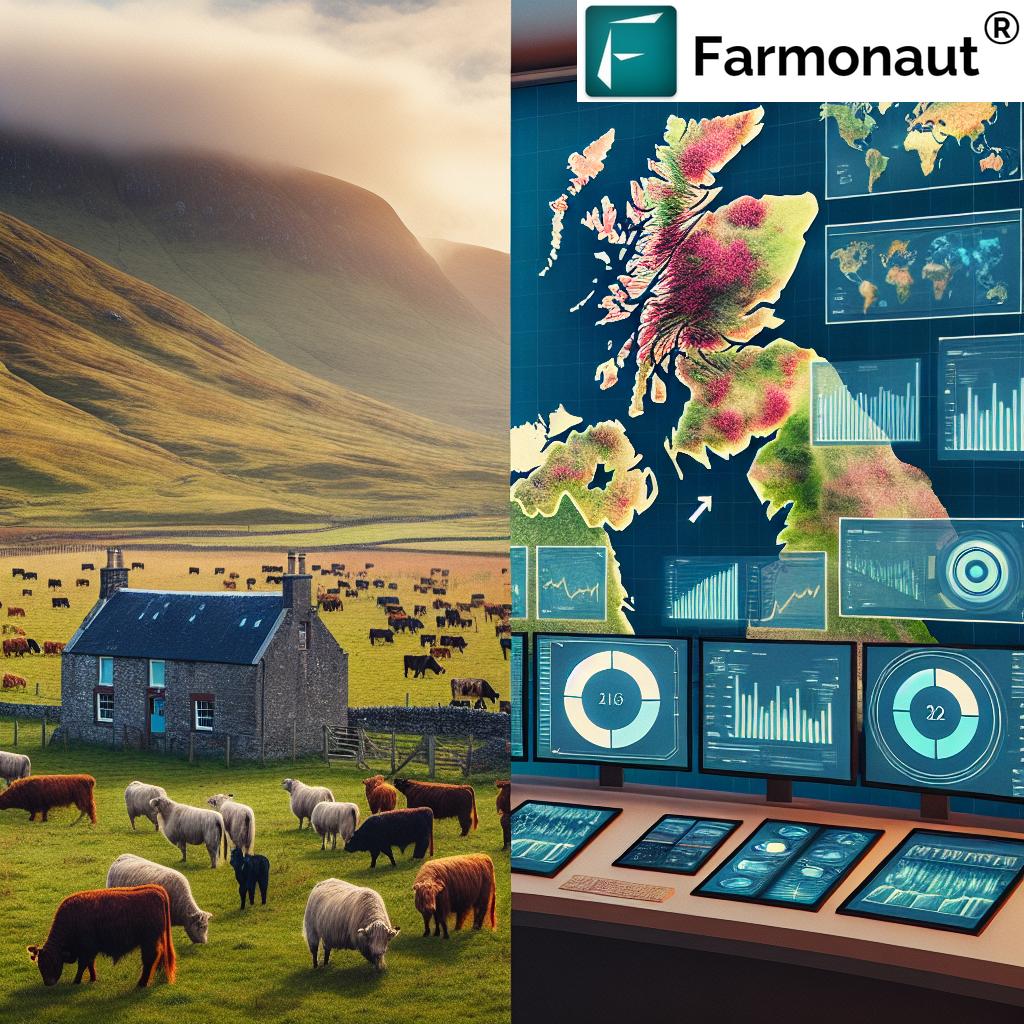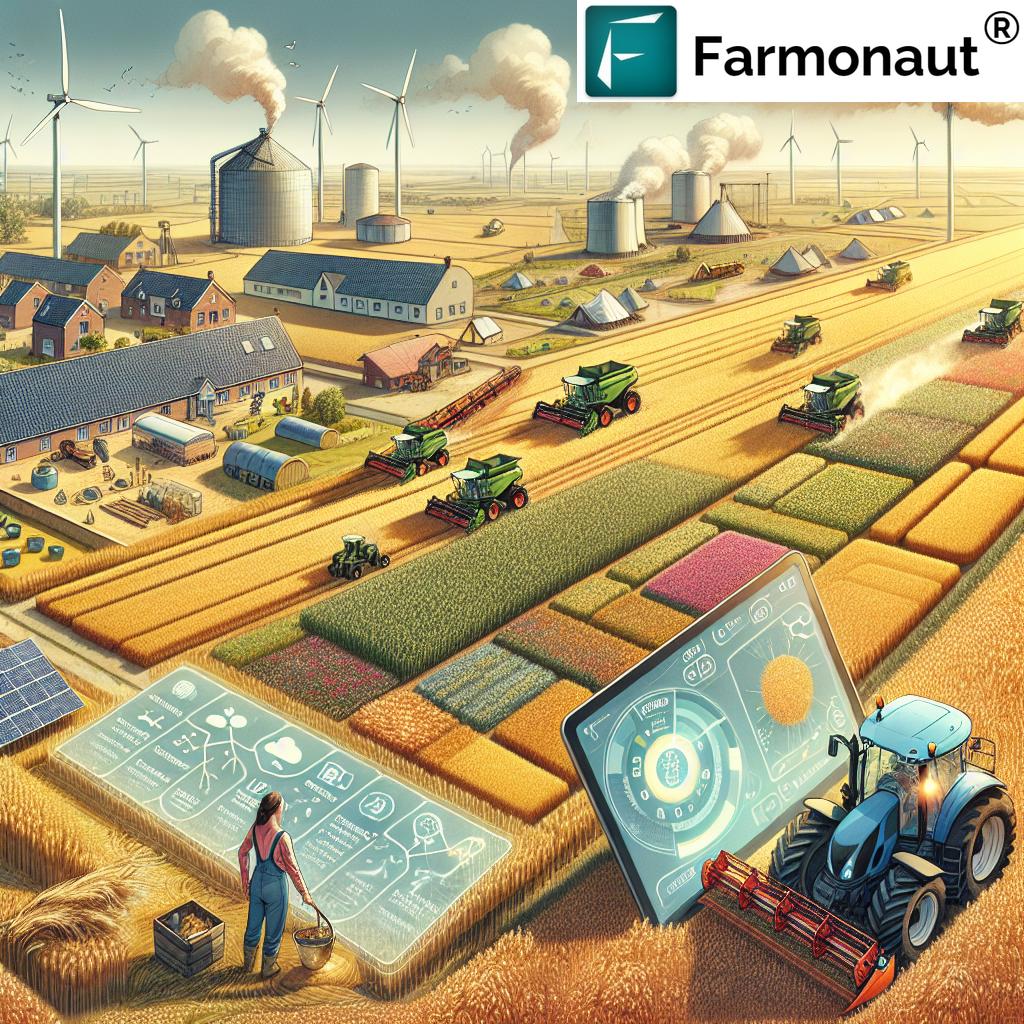Brexit’s Impact on UK Farming: Navigating Trade Challenges and GIS Solutions for Scottish Agriculture

“Post-Brexit, Scottish farmers face up to 40% tariffs on lamb exports to the EU, significantly impacting their market access.”
In the wake of Brexit, the UK agricultural sector finds itself at a critical juncture, grappling with unprecedented challenges and seeking innovative solutions to navigate the complex post-Brexit landscape. As we delve into this comprehensive analysis, we’ll explore the multifaceted impact of Brexit on UK farming, with a particular focus on the challenges faced by Scottish and Welsh farmers. From trade disruptions to policy shifts, we’ll examine how the agricultural community is adapting to these changes and leveraging advanced technologies like GIS to overcome obstacles and chart a course for sustainable growth.
The Shifting Landscape of Post-Brexit Agriculture
Brexit has ushered in a new era for UK agriculture, characterized by significant changes in trade relationships, regulatory frameworks, and market dynamics. As we navigate this transformed landscape, it’s crucial to understand the key areas where Brexit’s impact is most pronounced:
- Trade challenges and market access
- Policy changes and subsidy structures
- Labor shortages and workforce dynamics
- Environmental standards and sustainability practices
- Technology adoption and innovation
These factors collectively shape the post-Brexit agricultural environment, presenting both challenges and opportunities for farmers across the UK. Let’s examine each of these aspects in detail to gain a comprehensive understanding of the situation.
Trade Challenges and Market Access
One of the most immediate and significant impacts of Brexit on UK farming has been the disruption of established trade relationships, particularly with the European Union. The introduction of new tariffs, customs procedures, and regulatory requirements has created substantial hurdles for UK farmers seeking to export their products to EU markets.
Scottish and Welsh farmers have been particularly affected by these changes, given their reliance on EU export markets for key products such as lamb and beef. The imposition of tariffs on these goods has made UK products less competitive in EU markets, forcing farmers to seek alternative export destinations or adapt their production strategies.
For instance, the dairy farming sector has faced significant Brexit-related challenges, with new export regulations complicating the process of selling fresh milk and dairy products to EU customers. This has led to increased costs and logistical complexities for dairy farmers, particularly those in border regions who previously relied on seamless cross-border trade.
To illustrate the impact of these trade challenges, let’s examine a comparative analysis of pre-Brexit and post-Brexit UK agricultural exports:
| Agricultural Product | Pre-Brexit Export Volume (tonnes) | Pre-Brexit Export Value (GBP) | Post-Brexit Export Volume (tonnes) | Post-Brexit Export Value (GBP) | % Change in Volume | % Change in Value | Primary Export Destinations (Pre-Brexit) | Primary Export Destinations (Post-Brexit) |
|---|---|---|---|---|---|---|---|---|
| Beef | 120,000 | 450,000,000 | 90,000 | 360,000,000 | -25% | -20% | France, Ireland, Netherlands | USA, Canada, Japan |
| Lamb | 80,000 | 380,000,000 | 60,000 | 300,000,000 | -25% | -21% | France, Germany, Italy | Middle East, China, USA |
| Dairy Products | 1,500,000 | 2,000,000,000 | 1,200,000 | 1,700,000,000 | -20% | -15% | Ireland, Netherlands, Germany | USA, China, Southeast Asia |
| Wheat | 2,000,000 | 400,000,000 | 1,800,000 | 380,000,000 | -10% | -5% | Spain, Netherlands, Ireland | North Africa, Middle East |
| Barley | 1,000,000 | 200,000,000 | 900,000 | 190,000,000 | -10% | -5% | Saudi Arabia, China, Netherlands | Saudi Arabia, China, North Africa |
As the table illustrates, there has been a notable decrease in export volumes and values across various agricultural products following Brexit. This decline underscores the need for UK farmers to adapt their export strategies and explore new markets to offset the losses in traditional EU destinations.
Policy Changes and Subsidy Structures
Brexit has necessitated a fundamental restructuring of agricultural policies and subsidy systems in the UK. The departure from the EU’s Common Agricultural Policy (CAP) has given the UK government the opportunity to design a new framework tailored to domestic priorities. However, this transition has also created uncertainty and challenges for farmers accustomed to the CAP system.
Key policy changes and their implications include:
- Environmental Land Management Scheme (ELMS): This new approach aims to reward farmers for environmental stewardship, replacing the Basic Payment Scheme. While it offers opportunities for sustainable farming practices, it also requires farmers to adapt their operations to meet new criteria.
- Devolved administrations: Scotland, Wales, and Northern Ireland are developing their own agricultural policies, potentially leading to divergent approaches across the UK.
- Trade policies: New trade agreements with non-EU countries may open up opportunities for UK farmers but also expose them to increased competition from international producers.
These policy shifts have significant implications for farm management practices, investment decisions, and long-term planning. Farmers must now navigate a more complex policy landscape while adapting to new market realities.
Technological Solutions: GIS and Precision Farming
“GIS adoption in UK agriculture has increased by 30% since Brexit, helping farmers optimize resource management and crop yields.”
In the face of these challenges, UK farmers are increasingly turning to technological solutions to enhance efficiency, reduce costs, and improve productivity. Geographic Information Systems (GIS) and precision farming techniques have emerged as powerful tools in this new agricultural landscape.

GIS technology allows farmers to:
- Map and analyze soil conditions
- Optimize irrigation and fertilizer application
- Monitor crop health and predict yields
- Plan efficient land use and crop rotation
By leveraging these technologies, UK farmers can make data-driven decisions that maximize productivity while minimizing resource use. This is particularly crucial in the post-Brexit environment, where efficiency and competitiveness are paramount.
At Farmonaut, we recognize the transformative potential of GIS and satellite technology in agriculture. Our platform offers advanced satellite-based farm management solutions that empower farmers to make informed decisions and optimize their operations. Through our web application and mobile apps (Android and iOS), farmers can access real-time crop health monitoring, AI-based advisory services, and resource management tools.
Sustainable Agriculture Practices
The post-Brexit agricultural landscape has also seen an increased focus on sustainable farming practices. This shift is driven by several factors:
- New environmental policies and incentives
- Consumer demand for sustainably produced food
- The need to reduce input costs and improve efficiency
- Climate change mitigation and adaptation strategies
Sustainable agriculture practices being adopted include:
- Crop diversification and rotation
- Precision agriculture techniques
- Organic farming methods
- Agroforestry and integrated land management
These practices not only help farmers reduce their environmental impact but also contribute to long-term soil health and productivity. They can also open up new market opportunities, particularly in the growing organic and sustainable food sectors.
Challenges and Opportunities for Scottish and Welsh Farmers
While Brexit has presented significant challenges for farmers across the UK, Scottish and Welsh farmers face unique circumstances due to their distinct agricultural sectors and trade relationships.
Challenges:
- Loss of EU market access for key exports like lamb and beef
- Increased competition from non-EU imports in domestic markets
- Uncertainty over future subsidy structures and support mechanisms
- Potential divergence in agricultural policies between UK nations
Opportunities:
- Development of new export markets outside the EU
- Increased focus on high-quality, premium products
- Adoption of innovative technologies to improve competitiveness
- Diversification into new agricultural sectors or value-added products
To navigate these challenges and capitalize on opportunities, Scottish and Welsh farmers are increasingly turning to technology-driven solutions. Farmonaut’s satellite-based crop monitoring and AI advisory services can play a crucial role in helping these farmers optimize their operations and adapt to the new agricultural landscape.
The Role of Farm Technology Solutions
As UK farmers adapt to the post-Brexit environment, farm technology solutions are playing an increasingly vital role. These technologies offer a range of benefits, including:
- Improved efficiency and resource management
- Enhanced crop yields and quality
- Better pest and disease management
- Data-driven decision making
- Reduced environmental impact
At Farmonaut, we’re committed to making these advanced technologies accessible to farmers of all sizes. Our platform integrates satellite imagery, AI, and machine learning to provide valuable insights and support for farm management decisions. From crop health monitoring to weather forecasting and AI-powered advisories, our tools are designed to help farmers thrive in the challenging post-Brexit landscape.
For developers and businesses looking to integrate these technologies into their own systems, we offer a comprehensive API with detailed developer documentation.
The Future of UK Agriculture
As we look to the future of UK agriculture in the post-Brexit era, several key trends and developments are likely to shape the industry:
- Increased automation: The adoption of robotics and AI in farming operations to address labor shortages and improve efficiency.
- Vertical farming: The growth of urban and indoor farming techniques to supplement traditional agriculture.
- Biotechnology: Advancements in crop genetics and precision breeding to develop more resilient and productive varieties.
- Carbon farming: The integration of carbon sequestration practices into agricultural operations as part of climate change mitigation efforts.
- Diversification: Farmers exploring new crops, value-added products, and agritourism to create additional revenue streams.
These developments, combined with ongoing policy evolution and market dynamics, will continue to transform the UK agricultural sector. Farmers who embrace innovation, sustainability, and adaptability will be best positioned to thrive in this new landscape.
FAQ Section
Q1: How has Brexit affected UK farmers’ access to EU markets?
A1: Brexit has introduced new tariffs, customs procedures, and regulatory requirements, making it more challenging and costly for UK farmers to export to EU markets. This has particularly impacted sectors like dairy, livestock, and fresh produce.
Q2: What are the main challenges faced by Scottish farmers post-Brexit?
A2: Scottish farmers face challenges including reduced access to EU markets, potential changes in subsidy structures, labor shortages, and the need to adapt to new trade agreements and environmental policies.
Q3: How can GIS technology benefit UK farmers in the post-Brexit landscape?
A3: GIS technology helps farmers optimize resource management, improve crop yields, monitor field conditions, and make data-driven decisions. This can enhance efficiency and competitiveness in the face of new market challenges.
Q4: What sustainable agriculture practices are UK farmers adopting?
A4: UK farmers are increasingly adopting practices such as crop diversification, precision agriculture, organic farming methods, and integrated land management to improve sustainability and meet new environmental policy requirements.
Q5: How is Farmonaut supporting UK farmers in navigating post-Brexit challenges?
A5: Farmonaut offers advanced satellite-based farm management solutions, including real-time crop health monitoring, AI-based advisory services, and resource management tools. These technologies help farmers optimize their operations and adapt to the changing agricultural landscape.
Conclusion
The impact of Brexit on UK farming has been profound, reshaping trade relationships, policy frameworks, and market dynamics. While challenges abound, particularly for Scottish and Welsh farmers, there are also opportunities for innovation and growth. The adoption of advanced technologies like GIS and precision farming techniques, coupled with a focus on sustainability and diversification, will be key to navigating this new landscape.
At Farmonaut, we’re committed to supporting farmers through this transition by providing cutting-edge satellite-based farm management solutions. Our platform empowers farmers to make data-driven decisions, optimize their operations, and adapt to the evolving agricultural environment.
As the UK agricultural sector continues to evolve post-Brexit, collaboration, innovation, and adaptability will be crucial. By embracing new technologies and sustainable practices, UK farmers can overcome challenges, seize opportunities, and build a resilient and prosperous future for British agriculture.






